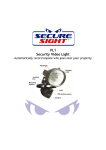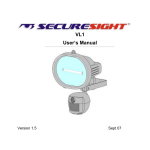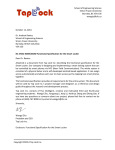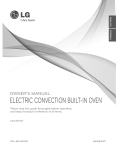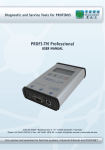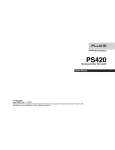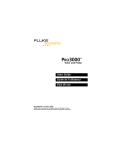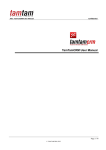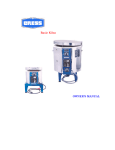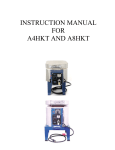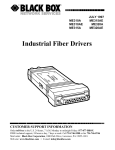Download ESA601 - Fluke
Transcript
ESA601 Electrical Safety Analyzer Getting Started Manual November 2004 © 2004 Fluke Biomedical, All rights reserved. Printed in USA Specifications subject to change without notice. Warranty Warranty and Product Support Fluke Biomedical warrants this instrument against defects in materials and workmanship for one full year from the date of original purchase. During the warranty period, we will repair or, at our option, replace at no charge a product that proves to be defective, provided you return the product, shipping prepaid, to Fluke Biomedical. This warranty does not apply if the product has been damaged by accident or misuse or as the result of service or modification by other than Fluke Biomedical. IN NO EVENT SHALL FLUKE BIOMEDICAL BE LIABLE FOR CONSEQUENTIAL DAMAGES. Only serialized products and their accessory items (those products and items bearing a distinct serial number tag) are covered under this one–year warranty. PHYSICAL DAMAGE CAUSED BY MISUSE OR PHYSICAL ABUSE IS NOT COVERED UNDER THE WARRANTY. Items such as cables and nonserialized modules are not covered under this warranty Recalibration of instruments is not covered under the warranty. This warranty gives you specific legal rights. You may also have other rights which vary from state to state, province to province, or country to country. This warranty is limited to repairing the instrument to Fluke Biomedical’s specifications. Warranty Disclaimer Should you elect to have your instrument serviced and/or calibrated by someone other than Fluke Biomedical, please be advised that the original warranty covering your product becomes void when the tamper-resistant Quality Seal is removed or broken without proper factory authorization. We strongly recommend, therefore, that you send your instrument to Fluke Biomedical for factory service and calibration, especially during the original warranty period. (When returning the product for any reason, be sure to follow the “Return Procedure” in “Standard Terms and Conditions” in the section in the Operator’s Manual called “Notices.”) In all cases, breaking the tamper-resistant Quality Seal should be avoided at all cost, as this seal is the key to your original instrument warranty. In the event that the seal must be broken to gain internal access to the instrument, you must first contact Fluke Biomedical’s Technical Assistance Department at 775-883-3400. You will be required to provide the serial number for your instrument as well as a valid reason for breaking the Quality Seal. You should break this seal only after you have received factory authorization. Do not break the Quality Seal before you have contacted us. Following these steps will help ensure that you will retain the original warranty on your instrument without interruption. Manufacturing Location The ESA601 is manufactured in Everett, WA, USA. Table of Contents Title Introduction .................................................................................................................... Unpacking the ESA601 .................................................................................................. Storage and Maintenance .............................................................................................. Characteristics................................................................................................................ Top and Side Panels ................................................................................................. Back Panel ................................................................................................................ Powering Up................................................................................................................... Support........................................................................................................................... Selecting Language Options .......................................................................................... Selecting the Printer Output ........................................................................................... Connecting the Device Under Test................................................................................. Selecting the Test Load.................................................................................................. Selecting the Operating Mode ........................................................................................ Performing Electrical Safety Tests ................................................................................. Error Codes .................................................................................................................... Power-Up Diagnostic Errors ...................................................................................... Startup Diagnostic Errors .......................................................................................... i Page 1 1 5 5 5 13 14 14 14 15 16 17 17 17 18 18 19 ESA601 Getting Started Manual Service........................................................................................................................... Specifications................................................................................................................. General Specifications .............................................................................................. Performance Specifications ...................................................................................... Leakage-Current Measurement............................................................................ Voltage Measurement .......................................................................................... Earth-Resistance Measurement ........................................................................... Insulation Measurement ....................................................................................... VDE Differential Current....................................................................................... Mains on Applied Parts ........................................................................................ Input/Output-Connection Specifications .................................................................... Computer-Setup Specifications................................................................................. ii 20 21 21 22 22 22 23 23 23 24 24 25 List of Tables Table Title Page 1. 2. 3. 4. 5. 6. ESA601 Electrical Safety Analyzer (8 versions) .................................................................... Accessories ........................................................................................................................... Top and Side Panel Features................................................................................................ Back Panel Features ............................................................................................................. Power-Up Diagnostic Error Codes ........................................................................................ Startup Diagnostic Error Codes ............................................................................................. 2 3 7 13 18 19 iii ESA601 Getting Started Manual iv List of Figures Figure Title Page 1. 2. 3. 4. Top and Side Panel Views of the ESA601 ............................................................................ Back Panel View of the ESA601 (IEC) .................................................................................. Back Panel View of the ESA601 (AAMI) ............................................................................... The ESA601 Connected to a Device Under Test .................................................................. 6 11 12 16 v ESA601 Getting Started Manual WXWarning. Read before using Analyzer. To avoid possible electrical shock or personal injury, follow these guidelines: ! Do not use the ESA601 in any manner not specified in the Operator’s Manual. ! Before connecting or disconnecting a DUT to the ESA601, the FUNCTION-SELECTION KNOB should be set to the OFF position. ! Exercise extreme caution when a shock hazard is present at the instrument's measurement terminals during the following tests: ! Mains-Insulation test ! Applied-Parts-Insulation test ! Mains-on-Applied-Parts-Leakage-Current test ! Equivalent-Device-Leakage-Current test ! Equivalent-Patient-Leakage-Current test • Always turn OFF power to the ESA601 and unplug the power cord before cleaning the outer surface. • Portable devices located in isolated power systems should be tested on an earth-referenced power system. Either remove the DUT to an area with an earth-referenced power system, or use an extension cord to bring earth-referenced power to the DUT. • Inspect the product, if the instrument appears damaged or appears to operate in a manner not specified in the manual, DO NOT CONTINUE USE. Return the product for service. • Avoid spilling liquids on the analyzer; fluid seepage into internal components creates corrosion and a potential shock hazard. Do not operate the instrument if internal components are exposed to fluid. • Do not open this product. There are no user replaceable parts. vi Warnings (continued) Caution The ESA601 should be calibrated annually. Only qualified technical personnel should perform troubleshooting and service procedures on the ESA601. Do not expose the system to temperature extremes. Ambient operating temperatures should remain between 10 to 40 °C. System performance may be adversely affected if temperatures fluctuate above or below this range. Clean only with a damp, lint-free cloth, using a mild detergent, and wipe down gently. Before each use, inspect the test-lead ends for possible wear, cracks or breaks. Take leakage-current measurements only after earth resistance is measured and found to be compliant with the applied safety limit. If the DUT fails the Protective-Earth-Resistance test, the operator must discontinue testing and label the DUT defective.* If any single test fails, the test must be discontinued immediately and the DUT labeled defective.* *In order for the ESA601 Controller Software to comply with these statements, “Stop Autosequences On Failures” would need to be checked on the General tab, under the System Configure menu. vii ESA601 Getting Started Manual viii Getting Started Manual Introduction Unpacking the ESA601 This Getting Started Guide provides basic information on Fluke Biomedical's ESA601 Electrical Safety Analyzer (hereafter called the ESA601). Refer to the Operator’s Manual (provided on the CD) for complete operating instructions. Using Table 2 as a reference, unpack the ESA601 and its accessories from the shipping carton. Check for missing parts and inspect the unit carefully for damage, such as cracks, dents or bent parts. If items are missing or any physical damage is apparent, please call Fluke Biomedical for assistance. For information on ways to contact Fluke Biomedical, see the section in this manual called “Support.” Also, notify the carrier if the damage appears to be the result of a shipping mishap. Table 1 lists the eight available versions of the ESA601 Electrical Safety Analyzer. 1 ESA601 Getting Started Manual Table 1. ESA601 Electrical Safety Analyzer (8 versions) DUT Outlet (Test Receptacle) Detachable Power Cord Language Overlay Australian Australia/New Zealand AS/NZ 3112-1993 Australian English 1 ESA601-AUS ROW Schuko CEE7 European English 1 ESA601-SHK French Schuko CEE7 European French ESA601-FRA German Schuko CEE7 European German ESA601-DEU Italian Schuko CEE7 European Italian ESA601-ITAL United Kingdom United Kingdom BS 1363A British English 1 ESA601-UK United States United States NEMA 5-15R 120 V / 15 A English 1 (IEC Terms) ESA601-USA/IEC United States United States NEMA 5-15R 120 V / 15A English 2 (AAMI Terms) ESA601-USA Version Model # (international) 2 Electrical Safety Analyzer Unpacking the ESA601 Table 2. Accessories Item Part Number Standard Accessory RED test lead with probe 2391738 X BLACK test lead with probe 2391723 X ESA601 Operator’s Manual & Controller Software CD 2388919 X Serial cable (Null Modem) 2238626 X ESA601 Getting Started 2243822 X Five alligator/banana plug adapters 2391714 X Soft-sided carrying case 2248650 X Country-specific power cord Optional Accessory X 3 ESA601 Getting Started Manual Table 2. Accessories (cont.) Item 4 Part Number Standard Accessory Optional Accessory DPU414 serial printer, 40 columns with choice of AC adapter 2248899 X 120-V AC adapter 2235375 or 220-V AC adapter 2235382 North American 220-V adapter kit 2185787 X U.S. 220 V power cord 2238671 X DPU414 serial printer cable 2238659 X Alligator clamp 2004175 X Banana/ECG adapters 2391669 X ESA601 Service Manual 2243831 X Electrical Safety Analyzer Storage and Maintenance Storage and Maintenance Characteristics As with most electronic equipment, the ESA601 should be operated in a dry area within normal temperature limits (10 °C to 40 °C). The maximum relative humidity at temperatures up to 31 °C is 80 %, decreasing linearly to 50 % relative humidity at 40 °C. The following two sections will help familiarize you with the ESA601 Electrical Safety Analyzer’s controls and features. There are no special storage requirements. However, when storing the unit, maintain the storage temperature between -25 °C and 50 °C. Although the power output from the ESA601 is not potentially dangerous, internal circuits carry potentially lethal voltages and currents. For safety reasons, maintenance requiring internal access should be performed only by an experienced technician. Top and Side Panels Table 3 lists and describes the controls (called out in Figure 1) located on the top and side panels of the ESA601. Some controls will have two names. The first name is the IEC nomenclature and the second, the AAMI nomenclature. 5 ESA601 Getting Started Manual 9 8 11 10 12 13 7 6 14 5 15 16 3 17 4 2 1 20 19 18 ayq01f.eps Figure 1. Top and Side Panel Views of the ESA601 6 Electrical Safety Analyzer Characteristics Table 3. Top and Side Panel Features No. 1 Name TEST RECEPTACLE Description An equipment outlet, specific to the version of the instrument, that provides a DUT connection: AS 3112-1993 (Australia); BS 1363A (English – United Kingdom); NEMA 5-15R (English – United States); Schuko CEE7 (French, German, Italian, and ROW [international]). 2 OPEN-NEUTRAL INDICATOR An LED next to the NEUTRAL SWITCH, which illuminates with an amber light (OPEN) if Equipment L2 is OPEN. 3 OPEN-EARTH INDICATOR OR OPEN An LED next to the EARTH (or GROUND) SWITCH, which illuminates with an amber light (OPEN) if Equipment Earth is OPEN. GROUND INDICATOR 4 REVERSE-STATUS INDICATOR (DUT POLARITY) An LED next to the POLARITY SWITCH, which illuminates with an amber light (REVERSE) if the Equipment-Outlet polarity is reversed. 5 POLARITY SWITCH A rocker switch (toggle) with two positions (NORMAL, REVERSE), which reverses the polarity of the Equipment Outlet voltage. 6 EARTH SWITCH OR GROUND A rocker switch (toggle) with two positions (CLOSED, OPEN), which opens the connection between Mains Earth and Equipment Earth (GROUND). 7 NEUTRAL SWITCH A rocker switch (toggle) with two positions (CLOSED, OPEN), which opens the L2 line on the Mains side of the Mains POLARITY SWITCH. 7 ESA601 Getting Started Manual Table 3. Top and Side Panel Features (cont.) No. 8 Name M.A.P./ VDE EQUIV INSUL SWITCH OR ISO VDE EQUIV INSUL SWITCH A rocker switch with three positions (NORMAL, OFF, REVERSE). The NORMAL and REVERSE positions are momentary, while the natural resting position is OFF. When the MAINS APPLIED PARTS (or LEAD ISOLATION) leakage-current test function is selected, this switch permits NORMAL and REVERSE polarity of the isolated Mains voltage. When either the VDE: EQUIV PATIENT or VDE:EQUIV DEVICE function is selected, this switch permits NORMAL and REVERSE polarity of the isolated Mains voltage. When either the MAINS INSUL or AP INSUL (or LEADS INSUL) function is selected, this switch enables the insulation-test voltage if (and only if) the switch is held down in the NORMAL position. FUNCTION-SELECTION KNOB A rotary switch with unlimited rotation, which enables the selection of any of sixteen functions. 10 PRINT SWITCH A rocker switch with a momentary activation in the upward position, which sends the current measurement value to an ASCII text printer through the tester’s RS-232 serial port. Applies only to Local Mode. 11 OVER-RANGE-STATUS INDICATOR An LED to the upper right of the PRINT SWITCH, which illuminates with a solid red light (OVER RANGE) if the input exceeds measurement range. 9 8 Description Electrical Safety Analyzer Characteristics Table 3. Top and Side Panel Features (cont.) No. 12 Name HIGH-VOLTS-STATUS INDICATOR X W Description An LED to the lower right of the PRINT SWITCH, with caution symbols underneath, which illuminates with a flashing RED light (HIGH VOLTS) if M.A.P. voltage or 500 V DC is present on either the applied parts or L1/L2 on the equipment outlet. 13 OHMS-FUNCTION SWITCH A rocker switch that is functional only while the FUNCTION-SELECTION KNOB is positioned at the EARTH RES Ω (or GROUND WIRE RES Ω) function. This switch utilizes three positions (OFFSET / ZERO 0, OFF, MEASURE Ω). The mutually exclusive OFFSET / ZERO 0 and MEASURE Ω positions are momentary, while the natural resting position is OFF. A one-amp supply is turned ON when the switch is depressed to either the OFFSET / ZERO 0 or MEASURE Ω position, and is turned OFF when the switch is released. Meter readings are saved on the display for printing (if desired) upon release of the switch. A null offset is generated when OFFSET / ZERO 0 is depressed and the meter reads < 0.150 ohms; OL displays if a null offset was not generated. The null value is stored until another null is done. 14 APPLIED-PARTS-SELECTION KNOB A rotary switch with eleven usable positions, which enables the selection of any individual – or all ten – applied parts (or ECG Leads) connectors. OR ECG-LEADS-SELECTION KNOB 9 ESA601 Getting Started Manual Table 3. Top and Side Panel Features (cont.) No. 10 Name Description 15 SIGNAL CONNECTIONS Three safety-style banana jacks, which provide signal connections: RED – signal input connection for Dual-Lead-Voltage, Dual-LeadLeakage, and Protective-Earth-Resistance (or Ground-Wire-Resistance) tests, and Leakage Currents; GREEN – direct connection to Equipment Outlet Earth; and BLACK – signal input connection for Dual-LeadVoltage and Dual-Lead-Leakage tests. 16 POWER-STATUS INDICATORS Two LEDs next to the POWER SWITCH. The lower LED illuminates with a green light (POWER) when the tester is switched on, while the upper LED illuminates with a RED light (POWER FAULT) if the inlet polarity is reversed, or there is a fatal error at power-up. 17 POWER SWITCH A rocker switch (toggle) with two positions (ON, OFF), which controls operating power to the tester. 18 POWER (MAINS) INLET Accepts a standard IEC 60320-1 / C19 Mains inlet rated at 16 A and 250 V for Class-1 equipment in cold conditions. 19 LOAD-SELECTION SWITCH A slide switch, which permits the selection of either the ANSI / AAMI ES1 or the IEC 60601-1 patient load 20 RS-232 PORT A serial interface, which, in Remote Mode, enables remote operation of the ESA601, and provides a download port for processor firmware. In Local Mode, this port can be used to output test results to a serial ASCII printer when the PRINT SWITCH is pressed. Electrical Safety Analyzer Characteristics R N L F C1 AP1 AP2 AP3 AP4 AP5 C2 C3 C4 C5 C6 AP6 AP7 AP8 AP9 AP10 ayq02f.eps Figure 2. Back Panel View of the ESA601 (IEC) 11 ESA601 Getting Started Manual RA RL V2 LA V3 LL V4 V1 V5 V6 ayq03f.eps Figure 3. Back Panel View of the ESA601 (AAMI) 12 Electrical Safety Analyzer Characteristics Back Panel The back panel of the ESA601 features a full set of universal ECG jacks for connecting applied parts. Figure 2 shows the IEC nomenclature and Figure 3, the AAMI nomenclature. AHA and IEC color-coded dots label the jacks as an aid to connecting the corresponding U.S. and international ECG leads. Table 4 identifies the use of each ECG jack. Table 4. Back Panel Features Label Meaning RA or R, AP1 Right arm, applied part 1 RL or N, AP2 Right leg, applied part 2 LA or L, AP3 Left arm, applied part 3 LL or F, AP4 Left leg, applied part 4 V1, V2, V3, V4, V5, and V6 V Leads (U.S. and Canada), also referred to as pericardial, precordial, or unipolar chest leads C1, C2, C3, C4, C5, and C6 AP5, AP6, AP7, AP8, AP9 and AP10 Chest leads (international) Applied parts 5 through 10 13 ESA601 Getting Started Manual Powering Up 1. Turn the FUNCTION-SELECTION KNOB to the OFF position. 2. Power up the system by pressing the POWER SWITCH to the ON position. After three seconds the unit powers up, and a green light appears in the POWER LED to indicate the tester is switched on. 3. When the unit is powered up, the ESA601 will check for proper polarity and range of the ACinput voltage. During this check, the display indicates firmware version number X.XX (e.g., 1.00, etc.). If all goes well, the display should then show OFF. 4. 14 If the FUNCTION-SELECTION KNOB is not set to OFF when the unit is powered up, the unit immediately moves (with audible clicking) to the mode indicated by the current FUNCTIONSELECTION KNOB setting, and the display indicates a reading related to that selected function (usually a meter reading). If a fault is found at startup, a RED light appears in the POWER FAULT LED, and the ESA601 display indicates an error code. (For explanations of startup-error codes, see the section in this manual called “Error Codes.”) Support After power-up and connection, if the new ESA601 system fails to start or to operate successfully, please contact Fluke Biomedical immediately. The Technical Assistance Center is open between 8:00 AM and 5:00 PM, Pacific Standard Time, Monday through Friday, except holidays. When contacting the Technical Assistance Center, please provide the following information: ESA601 version and serial number; specific steps necessary to reproduce the problem; and a phone number where you can be contacted during the day. Contact Fluke Biomedical in the following ways Telephone: Mail: E-mail (800) 648-7952 ( in the U.S.A.) or (775) 883-3400 Fluke Biomedical 5200 Convair Drive Carson City, NV 89706-0403 [email protected]; [email protected] Selecting Language Options Five language options support the eight available factoryset versions of the ESA601 that are unique combinations of types of DUT outlet (test receptacle), detachable line cord, and overlay language: English with IEC nomenclature (“E”), English with AAMI nomenclature Electrical Safety Analyzer Selecting the Printer Output (“E-US,” default), French (“F”), Italian (“I”), and German (“D”). When the unit is initially received, the factory-set, defaultlanguage option should match the instrument’s overlay language. However, if this is not the case, or if for any reason the current default language is not the one desired, perform the following steps to change the default: 1. To select a language other than the current default, hold down the OHMS-FUNCTION SWITCH in the MEASURE Ω position while powering up the ESA601. 2. When the display indicates “SEL,” release the switch. 3. To cycle through optional language selections, repeatedly press and release the OHMSFUNCTION SWITCH in the MEASURE Ω position. 4. When the code for the desired language option (i.e., E, F, I, or D) displays, wait for two seconds; the language selection indicated on the display is saved automatically. 5. The new default language remains in effect until steps #1 through #4 are repeated. Note Choosing a language option affects only the report printouts and the responses to the remote port; it does not affect the display. Selecting the Printer Output The printer used should support RTS/CTS or XON/XOFF protocols. Printer operation requires a straight-through serial printer cable. For most ESA601 electrical-safety tests: 1. To print a top-level header in the language set as the current default, press the PRINT SWITCH with the FUNCTION-SELECTION KNOB set to the PRINT HEADER position. 2. To print the result of a function test (usually a meter reading), press the PRINT SWITCH in the upward position with the FUNCTION-SELECTION KNOB set to the desired function position. The ESA601 provides the meter reading, as well as the current status of related front-panel switches. Note If the PRINT SWITCH is pressed with the FUNCTION-SELECTION KNOB set to the OFF position, no printout results. 15 ESA601 Getting Started Manual Connecting the Device Under Test Figure 4 illustrates how to connect the ESA601 to a device under test. To grounded portion of enclosure ayq04f.eps Figure 4. The ESA601 Connected to a Device Under Test 16 Electrical Safety Analyzer Selecting the Test Load XWWarning To avoid the possibility of electric shock, the FUNCTION-SELECTION KNOB should be set to the OFF position whenever connecting or disconnecting a DUT to the ESA601. 1. 2. Connect the DUT’s applied parts to the universal ECG jacks on the back panel of the ESA601. (See Figure 3.) AHA and IEC color-coded dots label these jacks as an aid to connecting the corresponding U.S. and international ECG leads. Connect the power cord from the DUT to the version-specific test receptacle on the ESA601. Selecting the Test Load A slide switch on the ESA601 permits the selection of either the ANSI / AAMI ES1 or the IEC 60601-1 measurement load (American or European standards, respectively). Select the test-load type before beginning testing. The system responds with the message “WAIT,” followed by the message “REMOTE MODE OK.” Note When the mode is changed from Local to Remote, the system initially sets the “active” function to OFF. (This action turns OFF all power to the Equipment Outlet and to applied parts, but not power to the ESA601.) To change modes from Remote to Local, send the remote command LOCAL (with no parameters). The system responds with the message “LOCAL MODE.” Performing Electrical Safety Tests For test-principle diagrams and step-by-step testing procedures for each of the following ESA601 electricalsafety tests, refer to the Operator’s Manual provided on the CD-ROM (P/N 2388919). ! ! Selecting the Operating Mode Local Mode is the default setting upon powering up the ESA601. In Local Mode, functions are selected by manually positioning the FUNCTION-SELECTION KNOB. To change modes from Local to Remote, use a terminalemulation program to send the remote command REMOTE (with no parameters) to the RS-232 serial port. ! ! ! ! Mains Voltage or Mains Line Protective-Earth Resistance or Ground-Wire Resistance Mains-Insulation Resistance Applied-Parts-Insulation Resistance Earth-Leakage Current or Ground-Wire-Leakage Current Enclosure-Leakage Current or Chassis-Leakage Current 17 ESA601 Getting Started Manual ! ! ! ! ! ! ! ! Patient-Leakage Current or Lead-to-GroundLeakage Current Patient-Auxiliary-Leakage Current or Lead-toLead-Leakage Current Mains-on-Applied-Parts-Leakage Current or Lead-Isolation-Leakage Current VDE: Equivalent-Device-Leakage Current VDE: Equivalent Patient-Leakage Current VDE: Differential-Leakage Current Dual-Lead-Leakage Current Dual-Lead Voltage Error Codes The ESA601 performs self-diagnostic tests during powerup and startup. If a problem is detected during these times, an error code will be displayed. Power-Up Diagnostic Errors A power-up error is indicated if the ESA601 has the POWER LED on, POWER FAULT LED on, blank display, and continuously outputs one of the error codes (listed in Table 5) to the serial transmit line. If any of the Power-Up Error Codes occur, contact your local Fluke service center to arrange repair of the ESA601. Table 5. Power-Up Diagnostic Error Codes Code 18 Description 0x01 Instruction Test Error 0x05 RAM Test Error 0x09 Flash-Checksum Error Electrical Safety Analyzer Error Codes Startup Diagnostic Errors Code If a fault is found at startup, a red light appears in the POWER FAULT LED, and the ESA601 displays one of the following error codes: Err0 Err1 Err2 Description - AC Hot and Neutral are reversed. - There is a bad connection to Earth Ground. - The meter may need calibration. User Action EEPROM checksum error. - The unit probably needs calibration. To continue, hold down the OHMSFUNCTION SWITCH in the OFFSET / ZERO 0 position Input AC is out of range. (Turns ON the POWER FAULT LED.) - The meter may be out of calibration. To continue, hold down the OHMSFUNCTION SWITCH in the OFFSET / ZERO 0 position. Physical Earth to Neutral voltage is incorrect. (Turns ON the POWER FAULT LED.) To continue, hold down the OHMSFUNCTION SWITCH in the OFFSET / ZERO 0 position. User Action This may mean: Table 6. Startup Diagnostic Error Codes Code Description Contact Fluke Service Department. Err3 Error during SPI Bus Initialization. - This is a fatal error. Err4 Error in reading back Contact Fluke Service SPI Bus data from the Department. power control board. - This is a fatal error. Err5 Continuous input overload. To reset this error, remove inputs to the ESA601 then power OFF and back ON. 19 ESA601 Getting Started Manual Service The ESA601 should be calibrated once a year by a qualified technician. It is recommended that the instrument be sent to a Fluke service center for calibration or service. 20 Electrical Safety Analyzer Specifications Specifications Protection Circuitry: Signal I/O connections (excluding the RS-232 port and earth connections) withstand a continuous input of 264 V AC, 47-63 Hz, or ± 264 V DC without causing permanent damage. Size: 9.8 L x 3 D x 8.25 W (inches) Weight: ≤5 pounds Temperature: Operating: 10 to 40 °C. Storage: -25 to 50 °C Maximum Humidity: 80 % relative humidity up to 31 °C, decreasing linearly to 50 % relative humidity at 40 °C. General Specifications Operating Voltage Range: Mimimum 90 V AC Maximum 264 V AC Line Cords and AC Mains Inlet: 16 A or greater, 250 V for Class-1 equipment in cold conditions. Equipment Outlet: 15 A, 250 V for Class-1 equipment in cold conditions for Australian, European, and United States versions. Reduced to 13 A for the United Kingdom version. 21 ESA601 Getting Started Manual Performance Specifications Leakage-Current Measurement Voltage Measurement Ranging: Ranging: Auto Range (Mains Voltage): 90 to 264 V True-rms Range (Accessible Voltage): 0 to 264 V True-rms Configuration: Auto RMS current flowing through the IEC 60601-1 test load or AAMI test load (selectable). Range: 0 – 8000 µA True-rms Display Units: µA Display Resolution: Accuracy: Crest Factor: Input Impedance: 1 µA ±1 % of reading ± 2 µA @ DC and 25 Hz to 1000 Hz†; ±2.5% of reading (±2 µA) 1kHz to 200 kHz*† Frequency response DC to 1 MHz (-3 dB) <3 Per Figure 15 of IEC 601-1 1995 * Fullscale input †The accuracy of Mains-On-Applied-Part leakage currents shall be ±2% of reading ±6uA. 22 Display Units: Display Resolution: Accuracy: Crest Factor: V 1V ± 2 % of reading, ± 2 V <3 Frequency Response: DC to 1000 Hz -3 dB point DC Input Impedance: 1 MΩ Electrical Safety Analyzer Specifications Earth-Resistance Measurement VDE Differential Current Ranging: Auto Ranging: Auto Display Units: Ω Display Units: µA Range: 0 to 1.999 Ω Range: 10 µA to 10000 µA Display Resolution: 0.001 Ω Display Resolution: 10 µA Accuracy: ± 2 % of reading, ± 5 MΩ Accuracy: ± 2 % of full scale Current Source Amplitude: 1 A DC (± 10 %) Insulation Measurement Auto Ranging: Yes Display Units: MΩ Range: 0.5 MΩ to 100 MΩ Display Resolution: 0.1 MΩ Accuracy: Voltage Source Amplitude: 0.5 MΩ to 20 MΩ, ± 2 % of reading ± 200 kΩ; above 20 MΩ, ± 5 % of reading ± 200 kΩ 500 V DC (± 10 %) 23 ESA601 Getting Started Manual Mains on Applied Parts Voltage: ≥ 110 % of input Mains voltage (at no load) Phase: In-phase or 180 ° out-of-phase with Mains voltage Signal Connections: Input/Output-Connection Specifications Mains Inlet: Equipment Outlet (Test Receptacle): 24 Standard IEC 60320-1 / C20 Mains inlet rated at 16 A and 250 V for Class-1 equipment in cold conditions Specific to version of instrument: AS 3112-1993 (Australia) BS 1363A (English – United Kingdom) NEMA 5-15R (English – United States) Schuko CEE7 (French, German, Italian, and ROW [international]) Applied-Part Connections: RS-232 Serial Port: Three safety-style banana jacks: RED – signal input / output connection GREEN – direct connection to Equipment Outlet Earth BLACK – signal input / output connection for DualLead-Voltage and DualLead-Leakage tests Ten banana jacks that enable the connection of applied-parts (ECG) leads to the meter circuit: right arm, right leg, left arm, and left leg, plus 6 chest leads A serial interface that, in Remote Mode, enables remote operation of the ESA601, and provides a download port for processor firmware. In Local Mode, this port can be used to output test results to a serial ASCII printer when the PRINT SWITCH is pressed. Electrical Safety Analyzer Specifications Computer-Setup Specifications Serial Cable: Null modem is required Port: Bidirectional (Data Communications Equipment) RS-232 Baud Rate: 9600 Parity: None Start Bits: 1 Stop Bits: 1 Parity Bits: 8 25 ESA601 Getting Started Manual 26






































